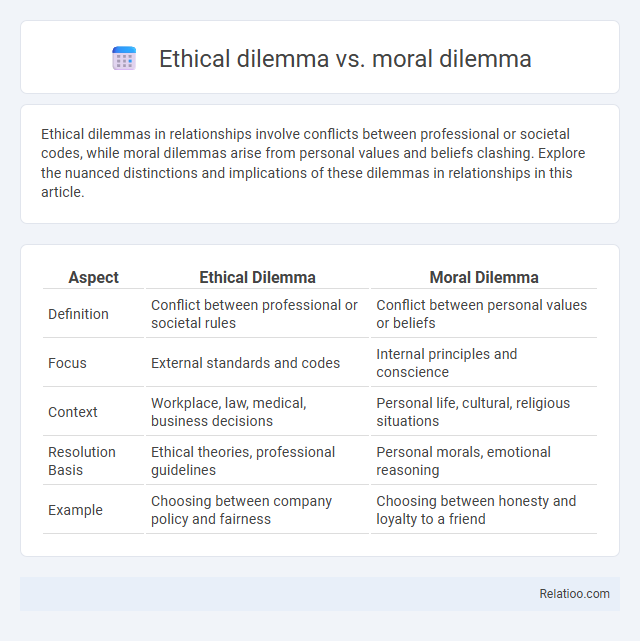Ethical dilemmas in relationships involve conflicts between professional or societal codes, while moral dilemmas arise from personal values and beliefs clashing. Explore the nuanced distinctions and implications of these dilemmas in relationships in this article.
Table of Comparison
| Aspect | Ethical Dilemma | Moral Dilemma |
|---|---|---|
| Definition | Conflict between professional or societal rules | Conflict between personal values or beliefs |
| Focus | External standards and codes | Internal principles and conscience |
| Context | Workplace, law, medical, business decisions | Personal life, cultural, religious situations |
| Resolution Basis | Ethical theories, professional guidelines | Personal morals, emotional reasoning |
| Example | Choosing between company policy and fairness | Choosing between honesty and loyalty to a friend |
Understanding Ethical Dilemmas
An ethical dilemma involves conflicting moral principles where you must choose between right and wrong actions, often in professional or societal contexts. A moral dilemma refers to a situation where personal values or beliefs clash, requiring you to make a difficult choice between equally significant ethical options. Understanding ethical dilemmas helps you navigate complex decisions by recognizing the underlying principles and evaluating the potential consequences of your actions.
Defining Moral Dilemmas
Moral dilemmas occur when an individual faces conflicting ethical principles, making it challenging to determine the right course of action based on moral values. Ethical dilemmas broadly involve situations where professional codes or societal norms clash, requiring decisions that balance competing duties or rules. A dilemma in general refers to any situation requiring a difficult choice between two or more equally unfavorable options, not necessarily tied to ethics or morals.
Key Differences Between Ethical and Moral Dilemmas
Ethical dilemmas involve conflicts between professional codes or societal standards, while moral dilemmas center on personal values and principles guiding individual behavior. A dilemma is a broader term describing any situation requiring a difficult choice between two or more options. The key difference lies in ethical dilemmas being externally defined by collective norms, whereas moral dilemmas arise from internal conflicts within personal conscience.
Real-Life Examples of Ethical Dilemmas
An ethical dilemma involves a conflict between two or more moral principles, such as honesty versus loyalty, often seen in medical decisions where patient confidentiality clashes with the need to disclose information for safety. Moral dilemmas arise from personal values and beliefs, like choosing between family obligations and personal ambition, while a general dilemma refers to any situation requiring a difficult choice between alternatives. Real-life ethical dilemmas include whistleblowing in corporate environments, where employees must decide between reporting illegal activities and protecting their jobs, or doctors facing decisions about life-sustaining treatments that may prolong suffering.
Real-Life Examples of Moral Dilemmas
A moral dilemma involves conflicts between ethical principles where choosing one value means compromising another, such as deciding whether to report a friend's harmful behavior to protect others. An ethical dilemma often occurs within professional contexts, like a doctor balancing patient confidentiality against the need to warn others of a contagious disease. Recognizing these distinctions helps you navigate real-life situations where your decisions profoundly impact others' well-being and societal norms.
The Role of Culture in Shaping Dilemmas
Ethical dilemmas arise when cultural norms clash with universal principles, influencing how individuals prioritize values such as honesty, loyalty, or respect. Moral dilemmas often reflect deeply ingrained cultural beliefs that shape the perception of right and wrong within a community, leading to varied responses across different societies. The broader category of dilemmas underscores the complex interplay between cultural context and decision-making, highlighting how diverse cultural frameworks shape conflicting choices and their resolutions.
Impact on Decision-Making Processes
Ethical dilemmas involve conflicts between competing moral principles that challenge Your ability to determine right from wrong based on societal norms, whereas moral dilemmas arise from personal convictions that create internal struggles affecting your values and choices. Dilemmas in general present situations where decision-making is difficult due to conflicting options, often leading to uncertainty and stress. These distinctions impact decision-making by influencing whether choices are guided more by external ethical standards, internal values, or situational constraints.
Resolving Ethical vs. Moral Dilemmas
Resolving ethical dilemmas involves applying established principles and professional codes to determine right conduct in complex situations, while moral dilemmas require personal reflection on values and conscience to choose between conflicting beliefs. Ethical dilemmas often arise in structured environments like workplaces or legal contexts, guided by external rules, whereas moral dilemmas are deeply personal and subjective, reflecting individual or cultural values. Effective resolution demands critical thinking, empathy, and sometimes compromise, ensuring decisions align with both professional ethics and personal morals.
Common Misconceptions and Overlaps
Ethical dilemma, moral dilemma, and dilemma often overlap but differ in focus, where ethical dilemmas involve conflicting principles in professional or societal contexts, and moral dilemmas center on personal values and beliefs. Common misconceptions include treating ethical and moral dilemmas as interchangeable, despite ethics relating to external codes and morals to internal convictions. Understanding these distinctions helps you navigate complex decision-making and clarifies when an issue is a true dilemma involving competing values or simply a difficult choice.
Importance of Addressing Dilemmas in Society
Addressing ethical, moral, and general dilemmas is crucial for fostering a just and cohesive society by promoting critical thinking and responsible decision-making. Ethical dilemmas involve conflicts between professional standards and personal values, while moral dilemmas often arise from competing personal or cultural beliefs. Effectively resolving these challenges helps maintain social harmony, supports legal frameworks, and enhances collective well-being.

Infographic: Ethical dilemma vs Moral dilemma
 relatioo.com
relatioo.com